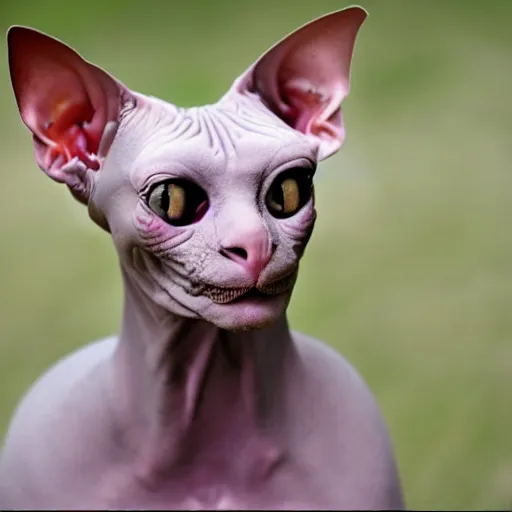When discussing "Down syndrome naked cats", it's essential to understand the reality of genetic disorders in cats, particularly those like the Sphynx cat, which often draws attention due to its unique appearance and health concerns. This article explores the idea of Down syndrome in cats, the genetic and health factors affecting Sphynx cats, and the broader context of feline genetic abnormalities.

Down syndrome in animals is a widely debated topic. Down syndrome is caused by a specific chromosomal abnormality (trisomy 21) in humans. However, cats cannot develop this condition because their genetic structure differs significantly from humans.
That said, some cats may exhibit symptoms similar to Down syndrome, such as:
Distinct facial features (e.g., broad noses or wide-set eyes)
Poor muscle tone
Developmental delays
These traits may result from rare genetic conditions in cats or congenital disabilities. They are not, however, Down syndrome as we understand it in humans.
The Sphynx cat, often called the "naked cat", is a hairless breed known for its wrinkled skin, large ears, and expressive eyes. These cats are not linked to Down syndrome, but their distinctive appearance can sometimes lead to misconceptions.
Wrinkled, hairless skin
Muscular build
Prominent cheekbones
Wide-set eyes
These features, while striking, are normal for the breed and unrelated to genetic disorders like Down syndrome.
Sphynx cats are affectionate, playful, and highly social, often described as "dog-like" in their behavior. They thrive on attention and form strong bonds with their owners, making them ideal companions.
Although Sphynx cats do not suffer from Down syndrome, they are prone to certain health concerns due to their genetics and lack of fur.
Hypertrophic Cardiomyopathy (HCM): A heart condition common in this breed.
Skin Conditions: Without fur, they are prone to sunburn and require regular cleaning to avoid oil buildup.
Respiratory Issues: Due to their lack of nasal hair, they are more susceptible to respiratory infections.
Hypersensitivity to Cold: Their lack of fur makes them vulnerable to temperature changes.
Proper Sphynx cat care includes regular baths, maintaining a warm environment, and routine vet visits to monitor potential health problems.
Cats, including the Sphynx, can experience genetic mutations that lead to rare disorders or unusual traits. These include:
Polydactyly (extra toes)
Dwarfism
Craniofacial abnormalities
While these conditions may mimic some traits associated with Down syndrome, they arise from different genetic factors.
The idea of cats with Down syndrome symptoms often arises from observations of cats with disabilities. These cats may have neurological conditions or facial deformities that lead to misinterpretation. However, such traits often stem from injuries, infections, or congenital defects rather than genetic syndromes like Down syndrome.
Whether a cat has a genetic disorder or a physical disability, proper care is crucial. Here are tips for caring for cats with disabilities:
Provide a safe and accessible environment.
Monitor for signs of pain or discomfort.
Schedule regular veterinary checkups.
Offer extra affection and mental stimulation.
One common question is, "Are Sphynx cats hypoallergenic?" While no cat breed is entirely hypoallergenic, the Sphynx produces less dander, making them a popular choice for allergy sufferers. However, their care requirements are more demanding due to their hairless nature.
Other hypoallergenic cat breeds include:
Balinese
Bengal
Russian Blue
Sphynx cats are often misunderstood due to their appearance. Here’s a summary of key facts to clear up misconceptions:
They do not have Down syndrome.
Their unique traits are standard for the breed.
They require attentive care but are generally healthy if bred responsibly.
Feline genetic abnormalities are an area of active research. Scientists aim to better understand hereditary conditions in cats, helping breeders and pet owners improve care for affected animals.
While "Down syndrome naked cats" is a misunderstood concept, the discussion highlights the importance of understanding feline health and genetics. The Sphynx cat, with its captivating looks and charming personality, remains a beloved breed. By dispelling myths and focusing on accurate information, we can better appreciate the uniqueness of these animals and provide them with the care they deserve.
animal tags: down-syndrome-naked-cats
We created this article in conjunction with AI technology, then made sure it was fact-checked and edited by a Animals Top editor.